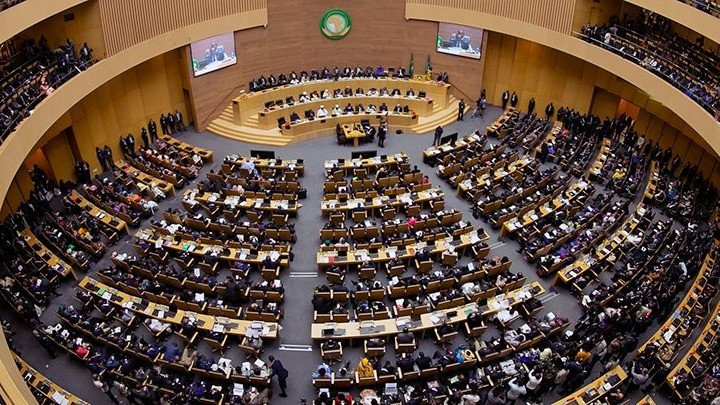Reparations: Africa’s Pathway to Climate Justice
On May 25, Africa celebrated Africa Day, commemorating the founding of the Organisation of African Unity in 1963 — now the African Union.
This year’s theme: “Justice for Africans and People of African Descent Through Reparations”, reflects a timely and pressing conversation: reparations as a means to achieve justice for centuries of slavery and colonial exploitation.
But to fully appreciate the depth and relevance of reparations in today’s world, we must expand the conversation to include climate justice.
Acknowledging historical wrongs is important, but it is equally urgent to confront the ongoing environmental injustices Africa continues to suffer.
Reparations must be a bold call for structural change — not only to redress the past, but to shape a more equitable and resilient future.
The call for reparations has long been anchored in the transatlantic slave trade and colonial subjugation, where African people and their resources were systematically exploited to enrich Western empires. These injustices laid the foundation for global inequalities that persist up to this day.
Yet the past is not a distant memory; its consequences live on in the form of broken institutions, structural poverty and environmental degradation.
Africa’s negligible contribution to greenhouse gas emissions — less than 4% cumulatively — stands in stark contrast to the disproportionate impact the continent suffers from climate change.
Cyclones in Mozambique and Madagascar, floods in Nigeria, droughts in the Horn of Africa and rising temperatures across the Sahel are no longer isolated incidents — they are manifestations of a climate emergency that threatens livelihoods, food systems, and development aspirations.
Rain-fed agriculture, upon which the majority of Africans rely, is becoming increasingly unreliable. As a result, more than 85% of the population faces food insecurity, with millions depending on food aid — often accompanied by conditions that entrench dependency and undermine sovereignty.
This is where the principle of climate justice becomes indispensable. Climate justice insists that those who have contributed the most to climate change — historically the industrialised nations of the Global North — must bear the greatest responsibility for addressing its impacts.
Justice is not served merely by reducing carbon emissions or pledging vague climate goals. It must come through reparative actions that recognise and respond to historical emissions, current inequalities, and the urgent needs of vulnerable communities.
Reparations, in the context of climate justice, must go beyond monetary compensation for historical wrongs. They must be understood as a demand for systemic change — an overhaul of the global financial, trade and governance systems that continue to marginalise Africa.
Financial transfers alone, while necessary, are insufficient if they are delivered through mechanisms that maintain neocolonial control and conditionalities.
One glaring example is the global climate finance architecture. Despite pledges of $100 billion annually to support climate mitigation and adaptation in developing countries, actual disbursements fall short.
Even when funds are made available, they often come in the form of loans rather than grants, further indebting countries already burdened by colonial-era debt structures. This financial stranglehold curtails Africa’s agency to define its own development paths and climate strategies.
True reparations must therefore dismantle these systems. They must include:
1. Unconditional debt cancellation for African nations, freeing up domestic resources for adaptation and sustainable development.
2. Technology transfers that empower African countries to adopt clean energy, build resilient infrastructure, and innovate climate-smart solutions.
3. Fair trade policies that stop penalising African farmers and producers while subsidizing Western agriculture.
4. Democratisation of global climate governance, including meaningful representation of African voices in international decision-making bodies such as the United Nations Framework Convention on Climate Change (UNFCCC) and International Monetary Fund.
Only then can reparations serve as instruments of empowerment rather than tools of control.
The case for climate reparations is both moral and legal. Morally, the logic is simple: those who polluted must pay.
Historically industrialised nations, through centuries of unchecked fossil fuel use and extractive practices, have accumulated wealth at the expense of planetary stability and the well-being of others. They have profited from an ecological debt that continues to accrue interest, with Africa paying the price.
Legally, the principle of “polluter pays” is well-established in environmental law. Moreover, international human rights frameworks underscore the right to life, health, food, water and a safe environment — all of which are being undermined by climate change. In this context, reparations are not acts of charity or generosity, but obligations grounded in responsibility and justice.
Some critics argue that reparations are impractical or politically infeasible. But such arguments often stem from a desire to maintain the status quo. What is truly impractical is expecting Africa to bear the brunt of a crisis it did not cause, with inadequate resources and limited capacity. It is unjust to expect resilience without responsibility, adaptation without assistance, or recovery without redress.
Reparations should also be framed as an opportunity — a chance to reimagine a more just and inclusive global order. By investing in Africa’s climate resilience, the world invests in its own stability. After all, climate change knows no borders. Migration pressures, food shortages and regional conflicts fueled by environmental stress will have global repercussions if left unaddressed.
A reparative approach offers a platform for genuine solidarity — not just between North and South, but among African nations as well. It allows African countries to collaborate on shared goals, pool resources, and strengthen regional institutions such as the African Union and African Development Bank. It encourages investment in indigenous knowledge systems, community-led adaptation strategies and local innovations that are often overlooked in mainstream climate discourse.
Moreover, reparations open the door to redefining what development means. Africa need not follow the same extractive, carbon-intensive model that led to the current crisis. With the right support and autonomy, the continent can leapfrog into a sustainable future — one driven by renewable energy, agroecology, and circular economies that prioritise people and planet over profit.
This year’s Africa Day theme must be seen not just as a historical reckoning, but as a clarion call for climate justice.
It is a demand that justice cannot be fragmented: we cannot honor the past without confronting the present. Reparations are not merely about what was taken centuries ago; they are about what continues to be denied today — dignity, agency, and a fair chance at a livable future.
Climate reparations represent Africa’s pathway to justice — but this path requires courage. The courage to speak uncomfortable truths. The courage to resist systems that thrive on silence. The courage to imagine alternatives rooted in equity and mutual respect.
The developed world, which has for so long dictated the terms of engagement, must listen. And more than that, it must act. Reparations are not acts of benevolence; they are acts of justice long overdue. If we are to build a just, climate-resilient world, then the conversation must shift from aid to accountability, from charity to change, from apology to action.
Africa does not seek pity; it demands justice. The time for reparations — meaningful, transformative and climate-centered — is now



